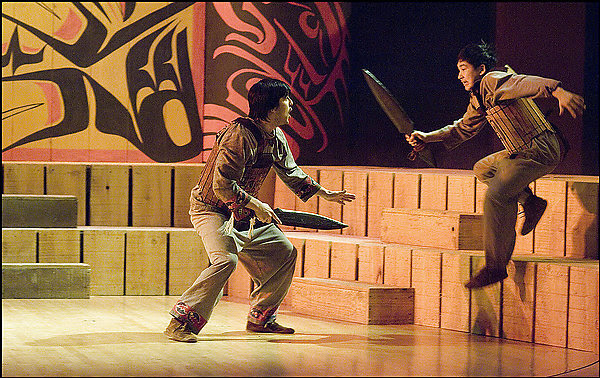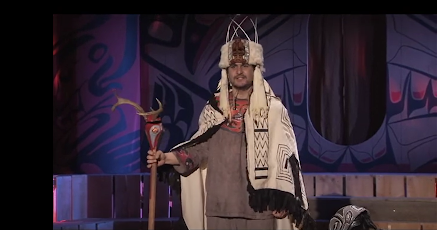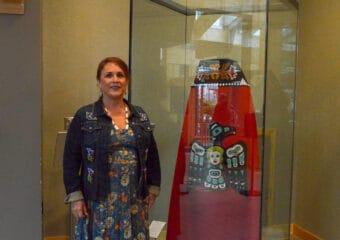
Last Thursday’s show at Juneau’s Goldtown Nickelodeon began with a blood-splattered formline title card on the screen. It read: “Macbeth through Alaskan eyes.”
Beating drums marked the entrance of the three witches. They danced and slinked across the screen wearing masks that showed the barred teeth of a shape-shifting otter from Lingít folklore.
As flashing stage lights evoked the stormy night that sets the play’s murderous plot in motion, actress Lily Hope delivered the familiar first line — when shall we three meet again?
“Xeitl tóox’, séew kaa ch’u k’eeljáa gé,” Hope said — in thunder, lightning, or in rain?
That line opens every performance of Macbeth. But the translation, and the elements of Lingít culture throughout, put a twist on Shakespeare’s tragedy.
The production first ran at Juneau’s Perseverance Theater in the early 2000s. It even had a 2007 run at the Smithsonian Museum of the American Indian in Washington, D.C.
“I remember going in the subways in D.C. speaking our lines together, in packed subways,” said Juneau actor Jake Waid, who played Macbeth. “And it was just like — to be in the nation’s capital, speaking our lines around the city — it was just a powerful experience to just feel like we were claiming the play.”
Recordings of the play were originally captured during those performances, but for years the footage was stored away in the Sealaska Heritage Institute archives. Now, it’s finally been adapted for the big screen as a film presented for 2024’s Celebration.

Director Anita Maynard-Losh came up with the idea for the play after spending more than a decade living in Hoonah. She’s not Alaska Native herself, but the Shakespeare expert said she saw similarities between Lingít culture and the Scottish values portrayed in the play.
“The Scots and the Lingít were extremely feared for their fierceness and their warfare” Maynard-Losh said. “And they had a deep connection with the supernatural. And they had a cultural value of putting the good of the group ahead of any one individual.”
Maynard-Losh says valuing community is a virtue that prevails in Macbeth, and one that’s infused into the Lingít translation, which was originally done by the late elder Johnny Marks Kooteix’téek. While most of the characters deliver their lines in Lingít, some of the play, including most of the soliloquies and clandestine meetings between Macbeth and his sinister wife Lady Macbeth, are in English.
“We decided that we were going to lean into the metaphor by having the people who were adhering to that cultural value speak in Lingít,” she said. “And when the people were not adhering to that value, and going for personal ambition, they spoke in English.”
But delivering the rest of the lines in Lingít was a challenge. Though all of the actors are Alaska Native, and many are Lingít, none were fluent speakers.
Waid said watching his performance brought back memories of rehearsing the difficult stanzas over and over with his castmates.
“It feels like a miracle that we got up on stage and we got the words out,” he said.
The play also incorporates cultural elements beyond language. The costumes and set feature formline designs. When Macbeth is crowned king, he dons a Ravenstail robe and a headdress adorned with ermine skins. When Banquo’s ghost haunts his killer Macbeth, he wears a raven costume.
And when the righteous Macduff finally vanquishes Macbeth, they face off with shields that are drums and swords that are drum sticks, punctuating each blow.
But in a lot of other ways, it’s just like any other Macbeth production, right down to superstition. Macbeth, in the world of theater, is often considered a cursed play. Hope recalls how, when they were putting the original production together, stage lights that fell from the ceiling and stage pieces that broke constantly felt like bad luck.
“I think it was four-fold with the Lingít language being 10,000 years old, where we were like ‘Oh, let’s pull out some really dark energy in here,’” Hope said.
For Waid, all the Lingít elements enhance the play for new audiences and actors without changing Macbeth’s core meaning.
“It’s one of the great plays in the English language. This is part of our history too, as English speakers, and also as people who want to dig deeper into our own culture and find meaning,” Waid said. “We’re not relegated to just what people might think of as Lingít things.”
Sealaska Heritage Institute staff said they’re hoping to screen the film again later this summer.
Disclaimer: KTOO 360TV was contracted to produce television and online video coverage of Celebration.



